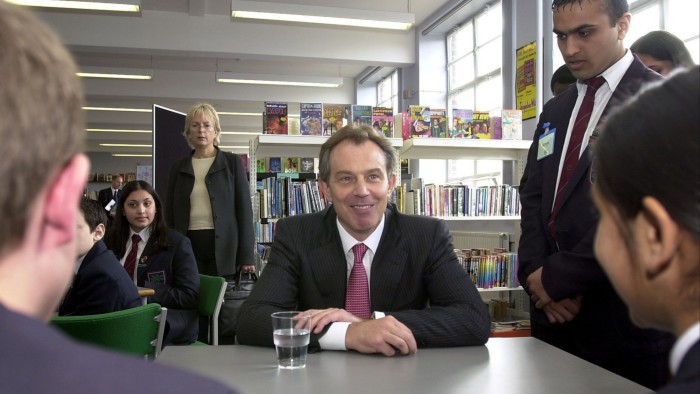Unlock the Editor’s Digest for free
Roula Khalaf, Editor of the FT, selects her favourite stories in this weekly newsletter.
The writer, director of economics of Public First Consultancy, served as an education adviser to the last UK government
In 1997 Tony Blair and the Labour party won power with the slogan “Education, education, education” and delivered on that promise. But the current Labour government seems determined not only to ignore their previous success, but to reverse some of it.
With birth rates falling, the demographic shift in the UK is likely to push the issue even further down the agenda — education is only 10th in the list of the public’s priorities. This is dangerous when it matters so much to our economy and to society.
If we look at the recent history, however, it’s plain to see the rewards of earlier efforts.
The literacy hour in primary schools resulted within two years in reading scores in the lowest performing areas outperforming the average scores for the year Labour was elected. The academy programme turned around schools that most people believed could not be turned around. Truancy and other forms of absence were dramatically reduced, getting children who had been written off back into class.
But education meant more to the last Labour government than just schools. Sure Start centres transformed early years education. The Institute for Fiscal Studies found that poorer children attending the first wave of these local hubs achieved two to three grades higher in their overall GCSEs — turning three Ds into Cs, for example — an effect it describes as “very large”. This sort of improvement was enough to cover the costs of the programme, as the children who benefited went on to earn more and pay more tax. At the other end, university fees were introduced but at levels that prevented graduates being indebted for life.
Labour raised funding for nurseries and schools, while universities were better resourced. Money does matter, and Labour reversed years of cuts made by previous governments.
Many of these reforms were unpopular at the time. Unions did not like the literacy hour or academies; students objected to tuition fees. But the government pressed on, and the changes improved standards and boosted economic growth and prosperity.
Contrast this with the Starmer government. First ministers decide to tax private schools. Now they suggest a levy on foreign university student fees. I can think of no government in UK history or around the world that sees schools and universities as a source of revenue.
The coalition and subsequent Conservative ministers built on some of Labour’s reforms. The academy programme was accelerated. But Sure Start centres were abolished, and the aim of pre-school provision has swung from giving poorer children the best start in life to getting parents back into paid work.
School attendance rates post-pandemic are back down to roughly where they were in 1997. The enormous rise in university fees caused so much disquiet that later increases have not kept up with inflation. Universities’ financial position is now unsustainable. Funding for schools and FE colleges is inadequate, with widespread recruitment issues.
The tragedy is that Labour could borrow from its own past and is not willing to do so. Any sensible government would recreate Sure Start centres. We learnt how to reduce absence rates, and again, simply following the earlier Labour playbook would work.
Giving schools freedom over pay unambiguously improved teacher recruitment and retention, and raised standards and results. And yet the current schools bill would prevent it. Academy chains are proposing a more sensible ratio of pay to pensions, to make teaching more attractive. Yet absurd Treasury rules are blocking this revenue-neutral change.
A government that taxes education and opposes school leaders’ evidence-based plans to improve standards has lost its way. It is time to learn some lessons from the past.




